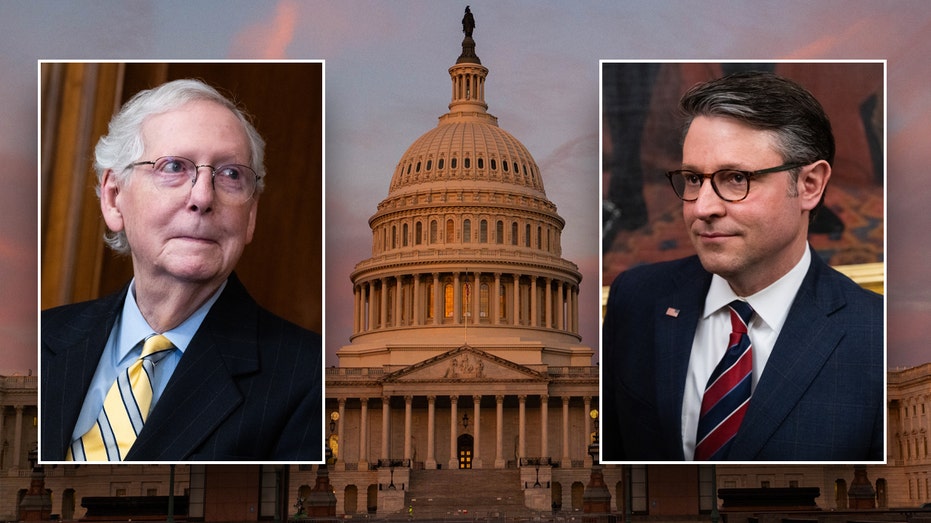A continuing resolution (CR), a temporary funding measure passed by Congress to provide interim funding for federal agencies when the regular appropriations bills have not been enacted by the start of the fiscal year, is appearing more likely to avert a government shutdown next week.
This would be a blow to the staggered deadlines that Congress agreed upon last year for appropriations to make it across the finish line set for Jan. 19 and Feb. 2.
“We ought to allow some time to do some work on the other bills and, if there is a CR, maybe in the March timeframe,” Senate Majority Whip John Thune, R-S.D., told reporters Tuesday.
In November, House Speaker Mike Johnson, R-La., stated he was “done” with short-term funding patches, known as a CR, which would fund government agencies temporarily until a permanent deal for the year is passed – placing him at odds with Republican leaders in the Senate. Senate Minority Leader Mitch McConnell, R-Ky., said Tuesday a CR would be the “obvious” route at this point.
SENATE GOP LEADERS BASH $1.66 TRILLION JOHNSON-SCHUMER BUDGET AGREEMENT: ‘CAN AND MUST DO BETTER’
Senate Majority Leader Chuck Schumer, D-N.Y., said Wednesday morning that congressional leaders “agree a shutdown would be a terrible way to start the year.”
“Speaker Johnson and I are on the same page on that,” he said. However, on many of the other policy specifics, they are worlds apart, as Johnson has floated including conservative policy additions in the ultimate spending agreement.
“This is the best deal that we could broker under the circumstances, and I think the pedal is to the metal,” Johnson told reporters Tuesday. However, on Wednesday, Johnson said he wouldn’t rule out a CR.
“I’m not ruling out anything, committing to anything other than getting these appropriations done. And I think we can,” he said.
Meanwhile, Congress still has the White House’s $110 billion national security supplemental request with aid to Ukraine to deal with, on top of an ongoing border security deal that lawmakers are trying to agree on. But Thune said Tuesday it’s unlikely those issues will get resolved until the government receives funding.
SENATE HAS ONLY PASSED 3 OUT OF 12 SPENDING BILLS AS DEADLINE LOOMS
On Jan. 19, funding will expire for several federal departments, including Veterans Affairs, Agriculture, Energy, Transportation and Housing and Urban Development.
On Feb. 2, Homeland Security, Labor, Health and Human Services, and the Defense Departments will also run out of funding.
So far, the Senate has only passed three of its 12 appropriations bills and the clock is ticking.
“I can imagine there’ll be a short-term spending bill to buy a little bit more time, but it does seem that a pathway has been created to get a final spending bill,” Sen. Bill Cassidy, R-La., told Fox News Digital in an interview Wednesday.
“We all know that it’s been difficult to get it done, but we’ve got to govern,” he said. “We’ve got to put Republican priorities in law, we’ve got to fund the military and other things. So I am cautiously optimistic that we’ll get it all done.”
Johnson and Schumer agreed to a topline figure over the weekend, amounting to $1.66 trillion in spending for the next fiscal year.
HOUSE, SENATE RELEASE BIPARTISAN AGREEMENT ON GOVERNMENT FUNDING AS SHUTDOWN DEADLINES LOOM
The budget comprises $886 billion allocated for defense and $704 billion designated for nondefense expenses.
According to Johnson, the achieved Republican concessions involve $10 billion in extra cuts to IRS mandatory funding (totaling $20 billion) and a $6.1 billion reduction from the Biden administration’s ongoing COVID-related funds.
Johnson said the new agreement would see some additional cuts to discretionary spending to offset the deal.
Meanwhile, Schumer said on the floor Wednesday that “there are 30 or so hard right Republicans in the House who labor under the illusion that they can bully everyone else into submission to get their narrow, hard right agenda enacted into law.”
“That’s what they’re trying to do in the appropriations process,” he said.
























